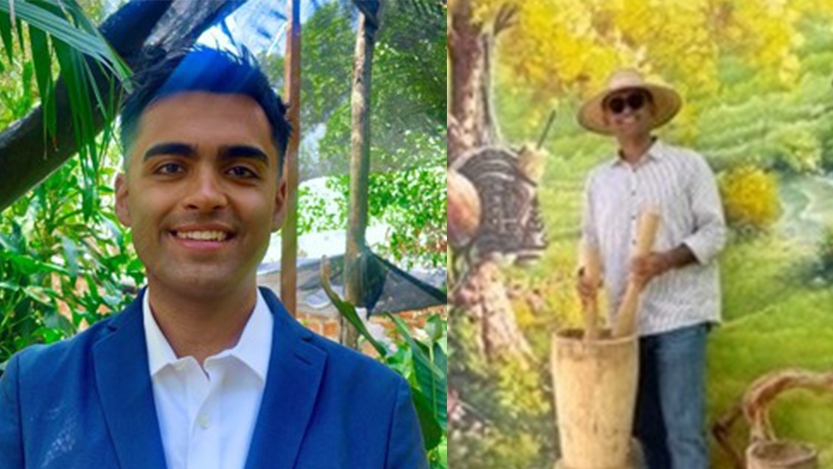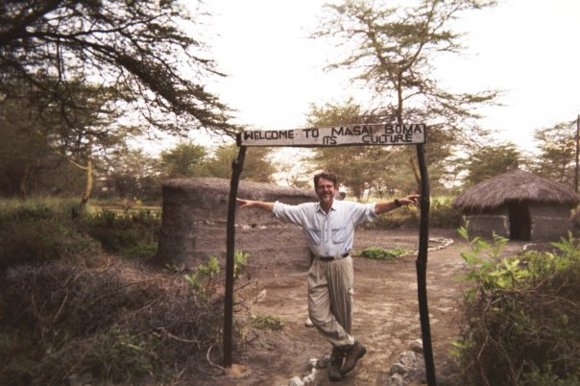Corps Connection: Middlebury's Peace Corps Link Runs Deep
2020s, Middlebury College, Academic Excellence, Alumni, Equity & Justice, Experience, Staff, Students

Peace Corps recently recognized Middlebury Collegeas one of the top producers of Peace Corps volunteers. The organization counts 418 Middlebury alumni among its ranks of volunteers across its 63-year history, making the College the fifth most prolific producer of volunteers among small colleges. The Middlebury Institute of International Studies in Monterey, meanwhile, ranks first among small graduate schools, with 101 alumni having served.
The organization sends volunteers to more than 60 developing countries around the globe, to live and work alongside local counterparts as schoolteachers, health care workers, agriculture agents, community development facilitators, and other positions.
Middlebury has long stood out as a strong Peace Corps breeding ground, but after a two-year COVID-driven shutdown, Peace Corps is less well-known among today’s college students, said Bill Bridgeford, Senior Peace Corps Recruiter for the New England region who served as a volunteer in Macedonia from 2016 to 2019. “We are trying to gain lost momentum,” Bridgeford said.
Spreading the word
If Michael Sheridan, Middlebury Professor of Anthropology, and some of his fellow faculty and staff members have anything to do about it, the Midd-Corps connection will continue to grow. Last fall, Sheridan assembled a list of 17 current Middlebury faculty and staff members from across campus who are Returned Peace Corps Volunteers (and more with other connections to campus). He also worked with the Center for Careers and Internships to organize a panel of RPCVs who shared their stories with an audience of about 25 Middlebury students.
“The goal here is to build a network of staff/faculty who can advise students about serving in the Peace Corps,” Sheridan said.
Sheridan joined the Peace Corps in 1988 just after graduating from Harvard. He spent two years designing and building water pipelines in Kenya. His experience—including the failure of some of those pipelines after he left—prompted him to pursue a PhD studying resource management in Africa. Now as an anthropology professor at Middlebury, he is still studying resource management in Africa and cites his Peace Corps experience prominently in his Middlebury bio.
“Peace Corps was an amazing experience that didn’t fit easily into the dichotomy of good and bad,” Sheridan wrote in his bio. “All of the high points were exhilarating; all of the low points were devastating. It made me more intensely alive than I had ever been, and it thoroughly transformed me.”
Bridgeford, who comes to campus at least once a semester, appreciates the efforts by Sheridan and other Middlebury staff to spread the word to current students. “To be endorsed by a professor who already has a rapport with these students makes my job a lot easier,” he said.
Midd students fit the bill
The Peace Corps experience blends well with Middlebury’s mission of preparing students to lead engaged, consequential, and creative lives, contribute to their communities, and address the world’s most challenging problems.
Three recent Middlebury alumni started their two-year Peace Corps stints in 2023. One of them is Nicholas Sebastian Cortez ’22, who is teaching English as a foreign language in Colombia. Cortez, who majored in Geography at Middlebury, said his undergraduate experience inspired him to join the Peace Corps and prepared him for his service.
“Middlebury has an unmatched dedication to language learning, and an education that focuses on preparing students to lead resolutions to global challenges while utilizing ethical, respectable, and inclusive methods of participation,” Cortez said. “Peace Corps service is an opportunity to put said skills into practice and be on the frontlines of collaborative change.”
Rebuilding momentum
Bridgeford said since the COVID-19 shutdown took Peace Corps off the radar for some current college students, he is trying to reach students at a younger age—in high school or early in their college career, letting them keep the idea in the back of their heads.
Tracy Himmel Isham, senior associatedirector of Career Education & Experiential Learning at Middlebury’s Center for Careers and Internships, has been helping Middlebury students connect with the Peace Corps for 20 years. Today’s students have more options for doing humanitarian work than their predecessors did, she said, but she continues to spread the word about Peace Corps and hopes to host another panel featuring young alumni who have served in recent years.
Bridgeford predicts the Middlebury-Peace Corps pipeline will grow. “Based on the number of Middlebury students who connected with me and the quality of the conversations I’ve had with them, I’m feeling optimistic that there’s going to be a decent number who have chosen this as their next option,” he said.


